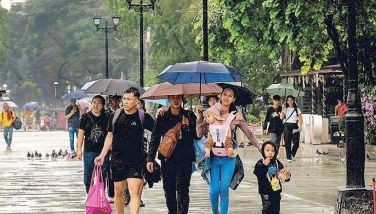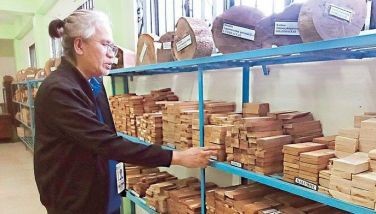Hong Kong's Tsang disappointed over government's hostage probe
YOKOHAMA – Hong Kong’s Chief Executive Donald Tsang yesterday told President Aquino here that his government was disappointed over how the Philippine government investigated the Aug. 23 hostage fiasco in Manila.
Tsang took the opportunity to talk with President Aquino during the sidelines of the Asia-Pacific Economic Cooperation (APEC) Summit here where he relayed the Hong Kong government’s position over the outcome of the investigation into the hostage incident.
Presidential Communications Development and Strategic Planning Office Secretary Ricky Carandang said the two leaders discussed the issue here. He said it was Tsang who pulled aside Mr. Aquino at the start of the summit.
Carandang said Mr. Aquino and Tsang “had a productive discussion on the lingering issues pertaining to the hostage crisis.”
“And it was a big step in finally resolving these major issues and we believe that this will be a closed chapter soon. The President said the meeting was productive and the talks were quite friendly,” Carandang said.
Carandang could not provide other details but stressed the two leaders wanted to put the issue behind them.
A report from Radio Television Hong Kong (RTHK) quoted Tsang as telling Mr. Aquino that the Hong Kong people wanted to see “justice done” and “accountability” in investigations into the hostage incident.
“He (Mr. Tsang) told the Philippine president that the people of Hong Kong had been shocked and saddened by the outcome of the hostage crisis and were watching closely to see how the case was being followed up,” RTHK said.
RTHK reported that Tsang “expressed disappointment at the Philippine government’s response to an earlier investigation report, and the leadership’s decision that four police officers and three government officials would face only administrative charges relating to the bungled attempt to rescue the hostages.”
Tsang said that he is hoping for a review and improvement in the procedures in handling similar situations so as to restore confidence of people traveling to the Philippines, RTHK said.
As this developed, the Philippines and China have agreed to increase judicial exchanges and visits with the aim of better understanding each other’s judicial systems.
The Department of Foreign Affairs (DFA) said Chief Justice Renato Corona made the agreement with his counterpart, Supreme People’s Court of China president Wang Shengjunon in Beijing.
The two officials exchanged views on how to further strengthen judicial cooperation between the high courts of the Philippines and China.
Corona also attended the 4th Asia-Pacific Judicial Reform Forum-Round Table Discussion hosted by the Supreme People’s Court of China.
“We should build on the goals of the Memorandum on Cooperation (MOC) signed by our two Supreme Courts in November 2008 to increase judicial exchanges between the Philippines and China,” Corona told Wang.
“We hope to send lawyers from our Supreme Court to have intensive exposure to learn about China’s judicial system,” he added.
Corona stressed bilateral relations between China and the Philippines have been strengthened through the years.
Wang, for his part, agreed with Corona that the Philippines and China should sustain the good bilateral relations even after the hostage fiasco that apparently strained diplomatic ties between the two countries.
Wang emphasized a solid foundation would also intensify judicial cooperation between the two countries, with the MOC serving as a launching pad to deepen cooperation between the two judicial branches.
Wang agreed to exchanges between lawyers and law scholars of the two sides that will facilitate mutual understanding of each other’s judicial system.
At the 4th Asia-Pacific Judicial Reform Forum-Round Table Discussion, Corona chaired one of the forum’s sessions, which focused on using technology to improve access to justice, reduce case backlog, improve judicial decision making and manage courts efficiently.
Corona was also invited to deliver a lecture on Judicial Reform in the Philippines at Renmin University’s School of Law, considered as China’s premier law school.
The lecture was part of the school’s “Grand Forum of the Most Honorable Judges” series. At least 100 students and faculty members of the law school attended the lecture.
Before the lecture, Corona was accorded an honorary professorship by the law school.
Corona lectured on three reform areas that the Philippine Supreme Court has given priority in order to increase people’s access to justice, especially those in the disadvantaged and marginalized sectors.
Corona also lectured on the advantages of using the latest technology in the judicial system, as well as reforms being undertaken in the Philippine judicial system, stressing the Supreme Court under his watch will be an active partner of the Filipino people.
“I am determined more than ever to bring about a better quality of life for our countrymen and make sure that the judiciary is efficient, effective and accessible to our people, especially the poor,” Corona said.
– With Pia Lee-Brago
- Latest
- Trending






























